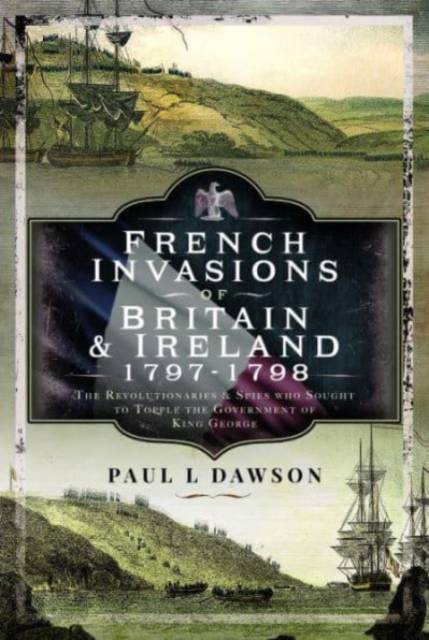
- Retrait gratuit dans votre magasin Club
- 7.000.000 titres dans notre catalogue
- Payer en toute sécurité
- Toujours un magasin près de chez vous
- Retrait gratuit dans votre magasin Club
- 7.000.000 titres dans notre catalogue
- Payer en toute sécurité
- Toujours un magasin près de chez vous
French Invasions of Britain and Ireland, 1797-1798
The Revolutionaries and Spies Who Sought to Topple the Government of King George
Paul L Dawson
Livre relié | Anglais
39,45 €
+ 78 points
Description
Not since 1066 - at least in popular myth - has an enemy force set foot on British soil. The Declaration of War with Revolutionary France in 1793 changed all that. In Ireland, the desire for home rule led Irish republicans to seek support from France and like-minded radicals in England. The scene was set for the most dangerous period in British history since William the Conqueror.
Irish dreams of independence, and of Revolutionary France's goal of securing her borders against the monarchies of Europe, coalesced. What better way of keeping Britain out of a war if her troops were tied down in Ireland? If the French could support an Irish Revolution, this would ensure the British Crown would be more focused on internal security than fighting overseas. The French, with a network of secret agents in Ireland and England, made their preparations for invasion
The invasion plan had been prepared by the English-born American political activist, philosopher, theorist and revolutionary Thomas Paine, whose writings had helped inspire the Americans to fight for independence from Britain. Paine sought to seize on discontent in England against the government of William Pitt and the increasing radicalism fostered by Wolfe Tone in Ireland for home rule, to topple the government, and bring about an Irish and English Republic.
A network of spies spread out across the England, Scotland and Ireland gathering information for the French and arming radical groups. Everything was set for an invasion. Mad King George's throne was set to be toppled, Charles James Fox installed as leader of the embryonic English Republic, while Ireland, under Wolfe Tone, would have home rule - so too Scotland.
But it took six years for the French to finally mount their attacks upon Britain. And when the invasions were eventually launched, they crumbled into chaos. This book seeks to charts the events that led up to the French invasion of Ireland in 1798, and how the invasion was foiled by William Pitt's own web of secret agents. William Huskisson, best known for being killed at the opening of the Liverpool and Manchester Railway, led a dangerous life as a spy master, whose agents foiled the French at every step.
Drawing on documents in the French Army Archives, as well as the records of the French Foreign Ministry and The National Archives in London, the largely forgotten story of the last invasion of Britain in 1797, as well as the final act of 1798, is revealed. Key documents are the campaign diary of the French commander from 1798, General Humbert, which has never been published in French or English. This, then, is the complete untold story of the French invasions and their sabotage, told for the first time in some 200 years.
Irish dreams of independence, and of Revolutionary France's goal of securing her borders against the monarchies of Europe, coalesced. What better way of keeping Britain out of a war if her troops were tied down in Ireland? If the French could support an Irish Revolution, this would ensure the British Crown would be more focused on internal security than fighting overseas. The French, with a network of secret agents in Ireland and England, made their preparations for invasion
The invasion plan had been prepared by the English-born American political activist, philosopher, theorist and revolutionary Thomas Paine, whose writings had helped inspire the Americans to fight for independence from Britain. Paine sought to seize on discontent in England against the government of William Pitt and the increasing radicalism fostered by Wolfe Tone in Ireland for home rule, to topple the government, and bring about an Irish and English Republic.
A network of spies spread out across the England, Scotland and Ireland gathering information for the French and arming radical groups. Everything was set for an invasion. Mad King George's throne was set to be toppled, Charles James Fox installed as leader of the embryonic English Republic, while Ireland, under Wolfe Tone, would have home rule - so too Scotland.
But it took six years for the French to finally mount their attacks upon Britain. And when the invasions were eventually launched, they crumbled into chaos. This book seeks to charts the events that led up to the French invasion of Ireland in 1798, and how the invasion was foiled by William Pitt's own web of secret agents. William Huskisson, best known for being killed at the opening of the Liverpool and Manchester Railway, led a dangerous life as a spy master, whose agents foiled the French at every step.
Drawing on documents in the French Army Archives, as well as the records of the French Foreign Ministry and The National Archives in London, the largely forgotten story of the last invasion of Britain in 1797, as well as the final act of 1798, is revealed. Key documents are the campaign diary of the French commander from 1798, General Humbert, which has never been published in French or English. This, then, is the complete untold story of the French invasions and their sabotage, told for the first time in some 200 years.
Spécifications
Parties prenantes
- Auteur(s) :
- Editeur:
Contenu
- Nombre de pages :
- 264
- Langue:
- Anglais
Caractéristiques
- EAN:
- 9781399068086
- Date de parution :
- 09-11-23
- Format:
- Livre relié
- Format numérique:
- Genaaid
- Dimensions :
- 160 mm x 236 mm
- Poids :
- 498 g







